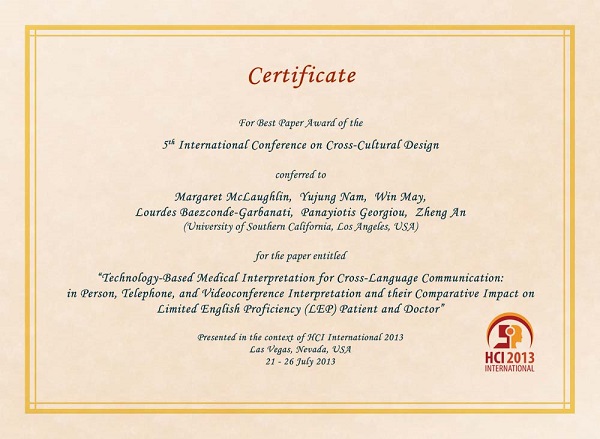

Cross-Cultural Design

Best Paper Award for the 5th International Conference on Cross-Cultural Design, in the context of HCI International 2013, 21-26 July 2013, Las Vegas, Nevada, USA

Certificate for Best Paper Award of the 5th International Conference on Cross-Cultural Design
conferred to
Margaret McLaughlin, Yujung Nam, Win May, Lourdes Baezconde-Garbanati, Panayiotis Georgiou, Zheng An
(University of Southern California, Los Angeles, USA)
for the paper entitled
"Technology-Based Medical Interpretation for Cross-Language Communication: in Person, Telephone, and Videoconference Interpretation and their Comparative Impact on Limited English Proficiency (LEP) Patient and Doctor"
Presented in the context of HCI International 2013
Las Vegas, Nevada, USA
21-26 July 2013
Paper Abstract
"Health care organizations face challenges in providing language services for Limited English proficiency (LEP) clients. Supported by a grant from the National Science Foundation, we have been working to develop a technology for proximate simultaneous medical interpretation. In an effort to understand the relative importance of physical proximity, audio cues and visual cues to effective interpretation, we conducted two controlled trials of the comparative impact on patient and provider satisfaction of four conditions which represent the interpretation circumstances with LEP patients and monolingual providers in hospital settings; a certified interpreter present in the consultation room (“In Person”); at a remote location mediated by audio only (“Telephone”); at a remote location mediated by audio and video (“Videoconference”), and no interpreter present (“No Interpreter). In study 1, dyads of a medical student and a standardized patient were randomly assigned to In Person or No Interpreter condition on a rotating basis, producing a total of 25 encounter sessions. In Study 2, four interpretation communication modes including Videoconference and Telephone condition simulated 25 encounters. Repeated measure one-way analyses of variance (ANOVA) showed preferences of patients and physicians for four different methods of interpretation. Patients expressed high satisfaction for their doctors regardless of the communication mode. Doctors’ perception of the interpretation quality was also as desirable in remote communication as onsite human interpretation. Patients reported significantly greater feelings of being guarded for their privacy and were more satisfied with the interpretation quality in the remote communication via telephone over in-person interpretation."
The full paper is available through SpringerLink, provided that you have proper access rights.

